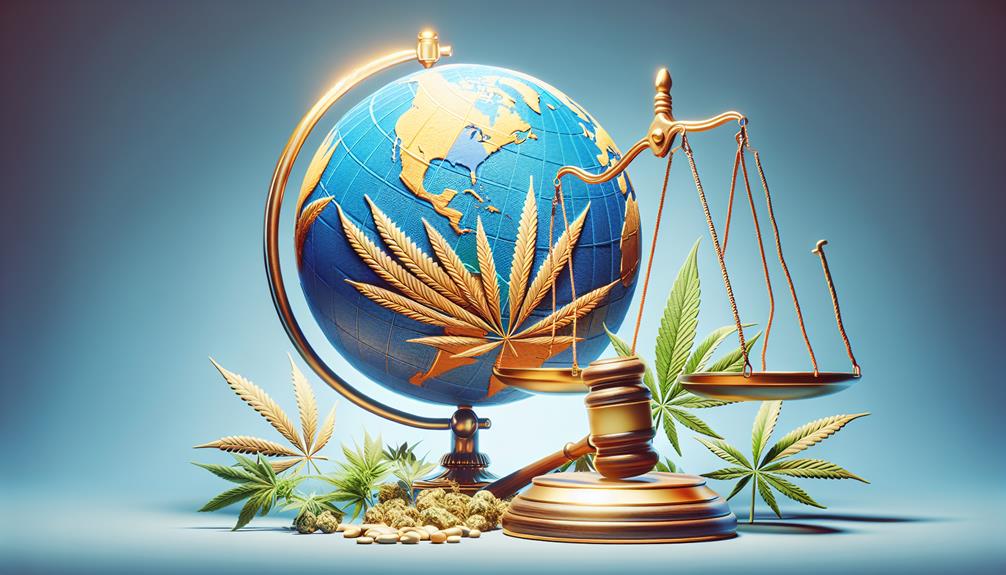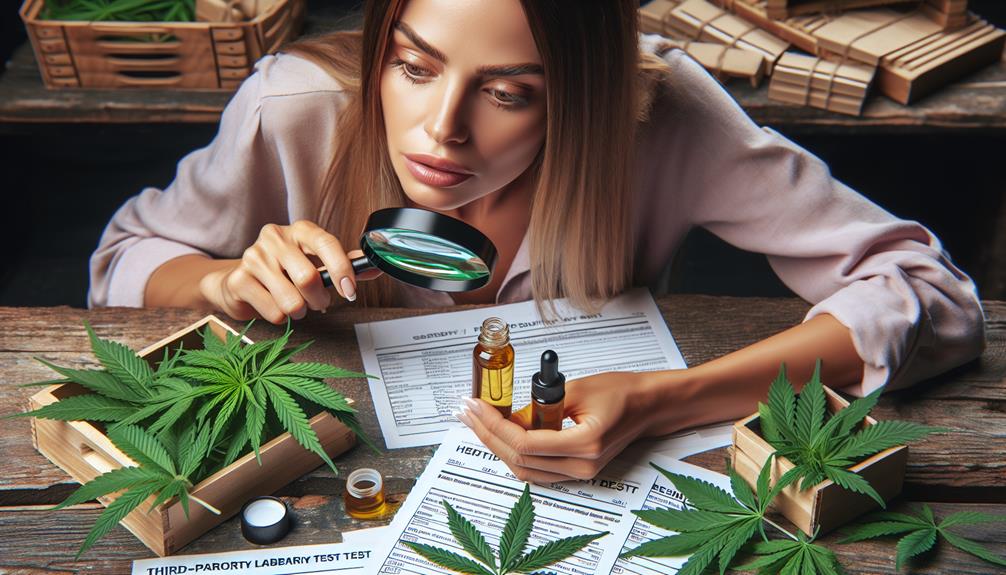You've likely noticed the surge in CBD products at your local health store, online, or even at some cafes where CBD-infused coffee is all the rage. As a non-intoxicating compound found in cannabis, CBD's popularity has skyrocketed due to its potential health benefits without the high associated with marijuana. You're probably wondering about its legality, its efficacy, and if it's safe for you to try. While the anecdotal evidence is compelling, you'll need a clearer understanding of what CBD is, how it's different from its psychoactive cousin THC, and what scientists have to say about its therapeutic possibilities. As you consider whether CBD might fit into your wellness routine, it's important to arm yourself with knowledge about the quality and sourcing of these products, as well as their diverse applications. Let's explore the world of CBD together, and by the end, you'll have a better grasp of its role in modern health and wellness—and perhaps even where it fits into your own life.
What Is Cbd?
CBD, short for cannabidiol, is a non-intoxicating chemical compound found in the cannabis plant that has gained attention for its potential therapeutic benefits. Unlike THC, CBD won't get you high, as it doesn't have psychoactive properties. It's derived primarily from the hemp plant, a variety of cannabis that contains very low levels of THC, making it the main source for CBD products.
Your body's endocannabinoid system, which helps regulate various physiological processes, interacts with CBD. This system plays a role in managing things like mood, appetite, pain, and immune response. CBD's ability to influence the endocannabinoid system is why it's being studied for a range of health benefits.
In the United States, thanks to the 2018 Farm Bill, CBD that's derived from hemp is legal under federal law, although state regulations can vary. It's critical to note that the FDA doesn't regulate the safety and purity of CBD products, which means you should exercise caution and do your research when selecting a product.
CBD's proven effectiveness in treating certain childhood epilepsy syndromes, like Dravet syndrome and Lennox-Gastaut syndrome, has been a significant medical breakthrough. It's also being explored for its potential to reduce anxiety and improve sleep patterns, but remember, it's not without side effects such as nausea, fatigue, and irritability, and it can interact with other medications.
CBD Vs. Marijuana
When comparing CBD to marijuana, it's crucial to understand that the former is a single compound often extracted from hemp, known for its therapeutic benefits without the high, whereas marijuana contains a mix of compounds, including the mind-altering THC. CBD is the non-psychoactive component of cannabis, meaning CBD does not cause a high. This is the principal difference that also influences the legal landscape surrounding these substances.
Under the legal definition of marijuana, outlined in the Controlled Substances Act, marijuana refers to the cannabis plants or products that contain significant levels of THC. This is the substance responsible for the intoxicating effects associated with marijuana use. Conversely, hemp-derived CBD contains less than 0.3% THC by dry weight, making it permissible under federal law in most cases.
While marijuana's legal status varies by state, CBD's legality hinges on its source and THC content. The 2018 Farm Bill federally legalized hemp and hemp-derived products, such as CBD, further distinguishing it from marijuana in a legal context. You can use CBD for its potential health benefits, which range from alleviating anxiety to reducing inflammation, without the risk of the psychoactive effects that come with marijuana.
CBD's Legal Status

You might find that CBD's legal landscape is as complex as its molecular structure. While the 2018 Farm Bill federally legalized hemp-derived CBD, you'll need to navigate the patchwork of state-by-state regulations that govern its use and sale. Moreover, if you're planning to travel, understanding the nuances of transportation rules for CBD is crucial to avoid any legal snags.
Current Federal Regulations
How does federal law in the United States govern the use and distribution of CBD, a compound found in both hemp and cannabis? The Controlled Substances Act once regulated CBD as a Schedule I substance. However, the Farm Bill removed hemp-derived CBD from this classification at the federal level, making it legal if it contains less than 0.3% THC.
Here's a quick guide to CBD's federal legal status:
| Factor | Hemp-derived CBD | Cannabis-derived CBD |
|---|---|---|
| Legal Status | Legal | Illegal |
| THC Content | < 0.3% THC | > 0.3% THC |
| Farm Bill | Legalized | Not affected |
| FDA Approval | Not required | Required |
| Clinical Trials | Eased in 2015 | Strictly regulated |
CBD's legality can still vary by state, so it's crucial to check local laws.
State-by-State Variance
While the federal landscape regarding CBD has clarified since the Farm Bill's passage, it's the state-level regulations that now present a complex mosaic of legality and restrictions. To navigate this terrain, you'll need to understand how:
- The legal definition of hemp versus marijuana affects CBD's legality. CBD derived from hemp is federally legal, while marijuana-derived CBD falls under different restrictions.
- States have legalized CBD with varying degrees of restriction, which may include limitations on THC content or the types of products that can be sold.
- Some states adhere strictly to the federal definition of marijuana, impacting the legal status of CBD products within those borders.
- The legal status of CBD can influence its availability and regulation, so it's crucial to stay informed about your state's specific laws.
Travel and Transportation Rules
Navigating the legality of CBD during travel requires a keen understanding of both federal and state regulations, as transportation across state lines introduces a patchwork of laws that may affect its permissibility. Since the Farm Bill passed in 2018, the use of pure CBD extracted from hemp is legal federally. However, it's essential to verify that CBD products contain less than 0.3% THC, the psychoactive component of cannabis.
Potential Health Benefits

As you explore the potential health benefits of CBD, consider its properties for pain relief, which have been supported by research suggesting efficacy in chronic pain management. Studies also indicate that CBD may play a role in reducing anxiety and stress, potentially offering a natural way to promote mental health. Furthermore, its potential to improve sleep could address insomnia, making it a multifaceted supplement for well-being.
Pain Relief Properties
Exploring the potential health benefits of CBD, you'll find that its ability to possibly alleviate pain stands out as one of the most promising aspects, with research hinting at its effectiveness in reducing inflammation and easing muscle and joint discomfort. Here's how you might experience pain relief with CBD oil:
- Inflammation Reduction: CBD may help decrease inflammation, which is often a root cause of pain.
- Muscle Relaxation: It could relax tense muscles, potentially providing comfort from cramps and spasms.
- Joint Support: CBD oil might offer relief for joint pain, assisting in mobility and reducing discomfort.
- Endocannabinoid System Interaction: By interacting with the endocannabinoid system, CBD could modulate pain signals, leading to a reduction in perceived pain.
Anxiety and Stress Management
While CBD's role in alleviating physical discomfort is notable, its potential to lower anxiety and stress levels is another key area of interest for researchers and consumers alike. Studies suggest that CBD may reduce anxiety and promote stress management, offering potential benefits for those with anxiety-related disorders. Its purported effects on mood could provide a sense of calm, which is particularly appealing in today's fast-paced world.
However, understanding the full impact of CBD on anxiety and stress requires more research. While anecdotal evidence and preliminary studies are promising, detail-oriented scientific inquiry is essential. As you consider incorporating CBD into your routine for anxiety and stress management, it's important to stay informed about the latest research to make well-founded decisions.
Sleep Improvement Potential
Delving into the realm of sleep enhancement, CBD may offer significant benefits by fostering relaxation and mitigating anxiety, potentially leading to improved sleep patterns and quality. If you're struggling with sleep disturbances, consider how CBD might help:
- Calming Effects: CBD has shown promise in promoting a sense of calm, which can be crucial for transitioning into a restful night's sleep.
- Anxiety Reduction: By diminishing anxiety, CBD can remove a common barrier to falling asleep, allowing for more consistent sleep patterns.
- Pain Management: Addressing pain and inflammation with CBD formulations can reduce discomfort that often disrupts sleep.
- Regulation of Sleep Cycles: Interaction with your body's endocannabinoid system may help regulate your sleep-wake cycles, enhancing overall sleep quality.
Safety and Side Effects

You should be aware that, although CBD is often well-tolerated, it can cause side effects like nausea, fatigue, and irritability in some individuals. These side effects are important to consider, especially if you're using CBD to manage health conditions, including the side effects of cancer treatments. While CBD is not associated with significant abuse or dependence potential, it's crucial to use it responsibly.
It's also essential to note that CBD can interact with certain medications, such as blood thinners, altering their effectiveness. High doses of CBD may lead to abnormalities in liver-related blood tests, signaling possible liver damage. Remember, CBD is sold as a supplement, and the FDA does not regulate the safety and purity of dietary supplements.
Here's a table summarizing the safety and side effects of CBD:
| Side Effect | Potential Cause | Consideration |
|---|---|---|
| Nausea | CBD intake | Monitor doses |
| Fatigue | CBD or interaction with other medications | Check with a doctor |
| Irritability | Individual reaction | Adjust usage |
| Medication Interaction | Concurrent use of CBD and prescription drugs | Consult healthcare provider |
| Liver Abnormalities | High CBD doses | Regular blood testing |
Stay informed and consult with a healthcare provider to navigate the use of CBD safely.
Consumption Methods
CBD's versatility is evident in its array of consumption methods, each tailored to meet specific needs and health objectives. You've got options ranging from discreet and convenient to fast-acting and potent. Here's a breakdown:
- Sublingual Oils and Tinctures:
By placing drops directly under your tongue, you allow the CBD to be rapidly absorbed into your bloodstream. This method ensures quick onset of effects, ideal for those needing immediate relief.
- Edibles and CBD Gummies:
Edibles, such as CBD Gummies, offer a pre-measured dose in a tasty package. They pass through the digestive system, which means a slower onset but longer-lasting effects compared to sublingual methods.
- Topicals:
Applied directly to the skin, topicals infused with CBD can target localized areas for inflammation and pain relief. This method is non-invasive and can be part of a regular wellness routine.
- Inhalation:
Vaping or smoking CBD provides the quickest delivery, with effects felt almost immediately. However, it's essential to consider the potential respiratory risks associated with this method.
Whether you opt for full-spectrum CBD to leverage the entourage effect or another type, remember that how you take CBD can significantly impact your experience. Choose wisely, and don't hesitate to consult with a healthcare provider.
Choosing Quality Products

When selecting a CBD product, it's crucial to seek out third-party lab testing and certificates of analysis for quality assurance. This ensures that the CBD cream or any product you choose is verified for its cannabinoid content and is free of harmful contaminants. Make sure the label clearly states the CBD content and if the product may contain other ingredients that could affect your experience or health.
Extraction methods also play a significant role in the quality of CBD products. Full-spectrum, broad-spectrum, and isolate refer to the cannabinoid profile and purity of the product, which can influence its effects. Furthermore, research the brand's reputation and read customer reviews to gauge the reliability and effectiveness of their products.
Here's a simple table to evoke the careful consideration you should take when choosing CBD products:
| Quality Indicator | Why It Matters | Emotional Benefit |
|---|---|---|
| Third-Party Testing | Ensures product safety | Peace of Mind |
| Extraction Method | Determines cannabinoid profile | Tailored Experience |
| Brand Reputation | Reflects product reliability | Confidence in Your Choice |
Always consider the source of the CBD. Hemp-derived CBD is typically legal and has lower THC levels while cannabis-derived CBD may have higher THC and different legal status.
Frequently Asked Questions
What Is CBD Info for Beginners?
You're starting to explore CBD, huh? Well, let's bust some myths: it's not psychoactive, so it won't get you 'high.' Now, its legal status varies, but it's generally okay in the U.S. if derived from hemp. As for consumption methods, you've got options: oils, capsules, vapes, and more. Each works differently, so choose what suits your needs. Remember, always check for quality and consult with a healthcare provider for safety!
What Is CBD Explained Simply?
You're navigating a maze of information, and at the center lies CBD: a compound from hemp, widely legal, often extracted through oils or capsules. It's not a high; it's therapeutic potential—touted for easing epilepsy to anxiety. But it's no cure-all; legality varies, and the FDA's still catching up on regulation. Always check for interactions, especially if you're on other meds. In simplicity, CBD's a complex blend of science and legal landscape.
How Much CBD Should a Beginner Start With?
As a beginner, you should start with 20-40 mg of CBD, adhering to dosage guidelines that consider individual sensitivity. Consumption methods vary; you can choose oils, capsules, or topicals. It's crucial to note your body's response and adjust the dose accordingly. Always consult with a healthcare provider before initiating any new supplement regimen to ensure safety and optimal dosing based on your specific needs and health conditions.
What Is CBD in Simple Terms?
CBD, often confused with marijuana, is actually a compound from hemp—completely legal and non-high inducing. You've likely heard misconceptions, but it's simply a substance studied for its potential health benefits, like easing anxiety or sleep issues. Its legal status varies, but it's mostly allowed across the US. Remember, hemp and marijuana are different; CBD comes from the former, ensuring you can use it without the psychoactive effects.
